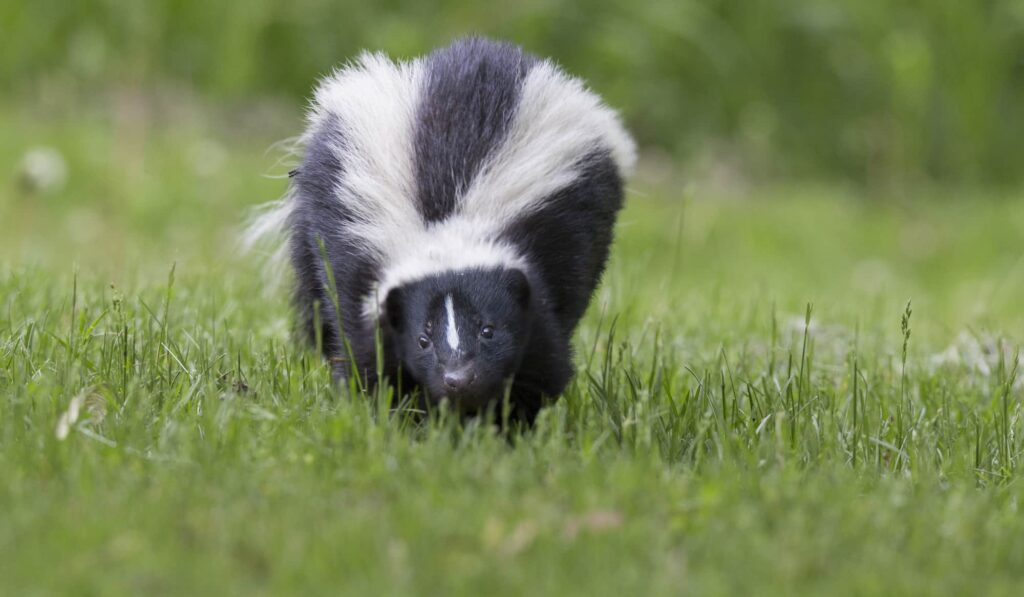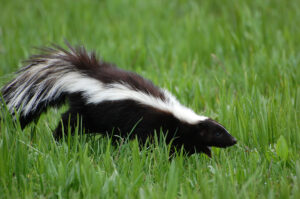If you’re a homeowner in Richmond Hill and you’ve spotted a skunk in your yard, it’s important to understand the potential risks associated with these furry animals. While they may seem harmless, these animals can carry rabies and other diseases that pose a threat to both you and your pets. Before attempting to get rid of skunks on your own, it’s crucial to educate yourself on the best practices for removal.
In this blog article, our Skedaddle experts discuss everything you need to know about skunks and rabies, from identifying the signs of a rabid skunk to understanding when to seek professional help with skunk removal in Richmond Hill. By the end of this article, you’ll be equipped with the knowledge and tools necessary to keep your home and family safe from skunk-related risks.
Understanding the Rabies Virus and Its Transmission
Rabies is a deadly virus that primarily affects the nervous system of mammals, potentially leading to death if not treated promptly. This virus is typically transferred via the bite of an infected animal and can pose significant risks to humans and other pets. Among wildlife species, one of the carriers of the rabies virus is skunks.
Transmission can easily happen when a rabid one bites a human or a pet, transferring the virus through its saliva. It’s crucial to take note, however, that the virus cannot penetrate intact skin – it must enter through a break in the skin, such as a bite or a scratch. Also, they do not have to be symptomatic (displaying signs of the disease) to transmit the virus. A latent period exists where the animal is infectious before it becomes symptomatic.
Precautions to Prevent Transmission
Prevention is key when dealing with the threat of rabies. To keep both you and your pets safe:
- Avoid direct contact with skunks. This includes not trying to feed or approach these animals, even if they appear friendly or uninjured.
- Vaccinate your pets against rabies. This is vital in protective measures, not only for your pets’ health but also to serve as a barrier between rabies in wildlife and human exposure.
- Report any skunk acting unusually to local animal control or wildlife professionals like Skedaddle.
- Secure your property to discourage skunks from taking residence. This includes sealing off possible den sites and securing your trash cans to deter scavenging.
If you have been bitten by a skunk or suspect exposure to rabies, seek immediate medical attention. Early treatment can potentially save lives.
Signs and Symptoms of Rabies in Skunks
Identifying the signs of rabies in skunks is a crucial step to ensure you take adequate precautions to protect yourself and your home. While it’s not always evident by outward signs if one is carrying rabies, there are some signs and behaviours that might indicate a skunk is infected.
- Unusual behaviour: They are primarily nocturnal animals. If you see one out during the day, this could be a potential sign of rabies. Also, rabid skunks may show signs of aggression or appear unusually tame. Agitation, restlessness, and strange behaviour are all potential signs of the disease.
- Physical signs: Physical manifestations may also include frothing at the mouth and a staggered gait. Although, these signs can also be symptoms of other illnesses or internal parasites.
- Inability to move: Paralysis or seeming inability to move parts of the body–often starting in the rear legs–can be a symptom of late-stage rabies.
- Self-Mutilation: In some cases, self-mutilation, such as biting its body parts, could be a sign it has rabies.
If a skunk in your vicinity shows these concerning signs, maintain a safe distance at all times and contact your local animal control department or your local wildlife removal experts, like those at Skedaddle.

Safe and Humane Ways to Deter Skunks from Your Property
There’s no doubt these black-and-white mammals can cause quite a disruption, and it’s reasonable to want to keep them at bay. Especially considering their potential as carriers of the rabies virus, home and property owners often express concern when these animals are spotted nearby. Fortunately, there are several strategies you can employ to deter them, all of which are humane and eco-friendly.
- Pet Food and Bird Feeds: The Unwanted Invitation
Always remember, that these animals are primarily driven by their need to find food. If they’re frequenting your property, it’s likely because they’ve found a reliable food source. This might be pet food, accessible trash or even birdseed. Be mindful of where and when you’re feeding pets outside, and clear away any uneaten food promptly. Trash should be secured in wildlife-proof containers, and consider taking down bird feeders if you’ve spotted these animals nearby. The fewer attractions your property holds, the less incentive they will have to visit.
- Landscape Modifications
Just as they’re motivated by food, these mammals also desire a safe space to call home. By changing the makeup of your property and eliminating appealing housing options, you can discourage their presence. For instance, these animals might be attracted to wood or rock piles, crawl spaces under decks or sheds, or dense vegetation. Work to remove these types of hiding places and you have taken a significant step in deterring them from hanging around your property.
- Fencing as a Solution
Fencing can be an effective deterrent. Installing a sturdy fence that extends a foot or more below ground level can keep these ambling animals from crossing into your property. However, the fencing should be installed by professionals to ensure it is effective and does not inadvertently trap wildlife inside your property.
To sum up, taking proactive steps and making your property less appealing can greatly reduce the chances of attracting these animals, thereby mitigating the risk of potential rabies transmission. Always remember, if you encounter these animals and are concerned about rabies, it’s crucial to reach out to a professional wildlife control service like Skedaddle.
Call Skedaddle for Skunk Removal in Richmond Hill
While these animals play a valuable role in our ecosystem, helping to control insect and rodent populations, their presence in populated urban areas can bring about unique challenges. Given the potential risk associated with rabies transmission, it’s crucial to utilize professional wildlife services if a skunk has taken up residence on your property. Skedaddle carries over three decades of experience in wildlife control and removal, providing safe and humane solutions.
Professional skunk removal services like Skedaddle take an approach that is both effective and respectful to the animal. Our team is trained to understand their behaviour, enabling us to effectively and humanely remove these black-and-white visitors from your property. We also seal off potential entry points to prevent re-entry and provide guidance on how to make your property less appealing to them.
Rabies Prevention through Skunk Removal Services
Skedaddle has developed a unique hands-on technique for removing skunks. This humane approach helps ensure the animal and the homeowners’ safety, minimizing potential exposure to diseases like rabies. Our techniques involve no chemicals or harmful substances, ensuring that the process is safe for both the skunks and the environment.
So, if you’re dealing with a skunk problem and are concerned about the threat of rabies, contact Skedaddle immediately. Our professional, experienced team will be able to assess the situation, remove any skunks, and provide guidance on how to make your property less appealing to these striped visitors in the future. Because when it comes to rabies, prevention is certainly better than treatment.
Let Skedaddle help keep your home and property safe from the potential risks associated with skunks. By working with our expert team, you’re choosing a safe, humane solution to your problem, giving you peace of mind and keeping your family and pets safe. Remember, when it comes to wildlife, it’s our responsibility to share the environment, and Skedaddle is here to help ensure we can do so harmoniously.
Protect your family, pets, and yourself from the risk associated with rabies virus transmission. Contact Skedaddle today!



